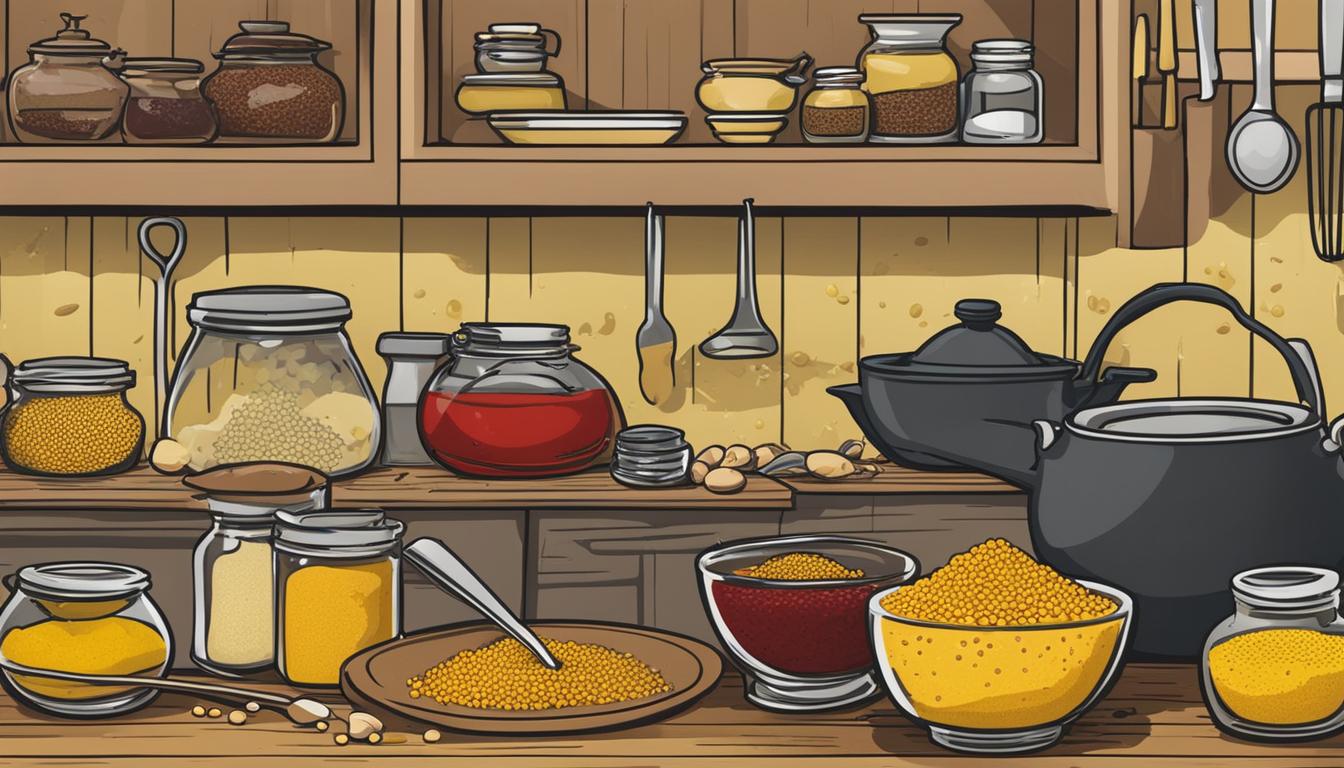Welcome to our article on mustard seed uses and benefits! Whether you’re an adventurous home cook or someone seeking natural remedies for your health, mustard seeds have something to offer. In this guide, we’ll explore the versatile ways you can incorporate mustard seeds into your cooking and how they can potentially improve your overall well-being.
Mustard seeds have a long history of culinary and medicinal uses. They can add depth and flavor to your dishes, and their unique properties may also provide several health benefits. Let’s dive deeper into the world of mustard seeds to discover their incredible potential.
From enhancing the taste of your favorite recipes to promoting digestion, reducing inflammation, stimulating hair growth, and nourishing your skin, mustard seeds have a lot to offer. Whether you’re a food enthusiast or someone looking to improve their health naturally, mustard seeds are worth exploring.
In the upcoming sections, we’ll explore what mustard seeds are, their distinct taste, different types of mustard seeds, and how they are used in cooking. We’ll also delve into their potential health benefits and explore substitutes and food pairings for mustard seeds.
So, let’s get started and unlock the secrets of mustard seed uses and benefits for your kitchen and health!
What Are Mustard Seeds?
Mustard seeds are the small seeds that come from the flowering mustard plants. These seeds have been used for centuries in various culinary purposes, adding a unique flavor and texture to dishes. Mustard seeds are not only known for their role in cooking but also for their medicinal properties. The mustard plant, Brassica juncea, belongs to the Brassicaceae family, which is the same family as cabbage, broccoli, and kale.
Mustard seeds are typically round and tiny, measuring around 1 to 2 millimeters in diameter. They come in different colors, including yellow, black, and brown, depending on the variety of the mustard plant. Yellow mustard seeds are the most common type and have a milder flavor compared to the stronger and more pungent black and brown seeds.
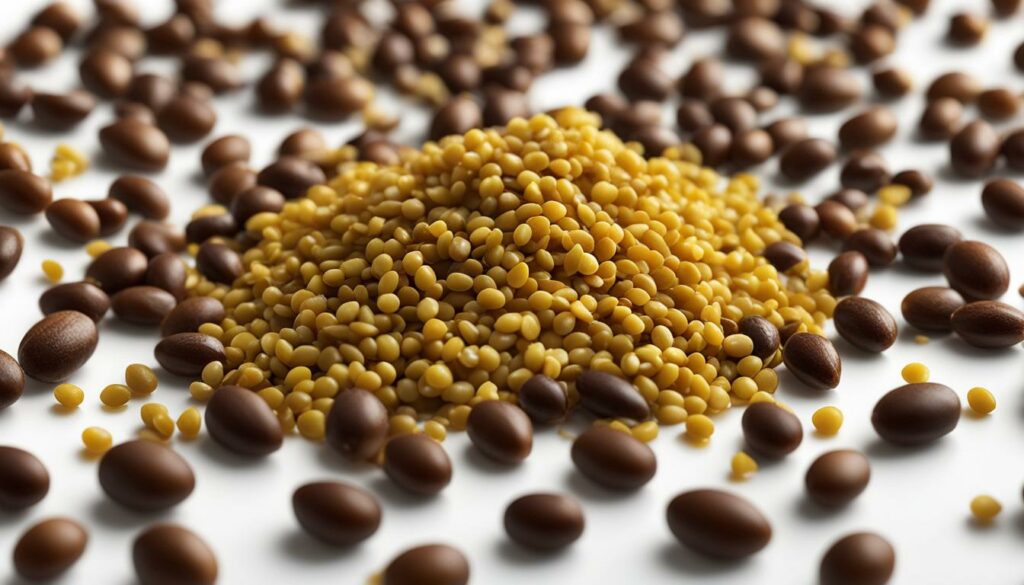
The yellow mustard seeds are popularly used to make the classic American mustard, while the black and brown mustard seeds are commonly used in Indian, Mediterranean, and Asian cuisines. The nutrient-rich mustard leaves, also known as mustard greens, are another part of the mustard plant that is edible and used in dishes like Sarson Ka saag.
Mustard seeds are highly versatile and lend their distinct flavor to a wide range of recipes, including sauces, dressings, curries, pickles, and marinades. They can be used whole, ground into a powder, or even made into a paste. Mustard seeds have a unique taste profile that adds depth and complexity to dishes, making them a popular choice amongst chefs and home cooks alike.
Mustard Seeds: Nutritional Profile
Before we delve further into the culinary uses of mustard seeds, let’s take a closer look at their nutritional composition. Mustard seeds are packed with essential nutrients that contribute to their potential health benefits. Here is a breakdown of the key nutrients found in mustard seeds:
| Nutrient | Amount per 100g |
|---|---|
| Calories | 508 |
| Protein | 26g |
| Fat | 36g |
| Carbohydrates | 28g |
| Fiber | 14g |
| Vitamin C | 21mg |
| Vitamin K | 2.6mcg |
| Folate | 73mcg |
| Calcium | 266mg |
| Iron | 9.21mg |
As seen from the table, mustard seeds are a rich source of protein, healthy fats, dietary fiber, and micronutrients like vitamin C, vitamin K, folate, calcium, and iron. Additionally, mustard seeds contain compounds called glucosinolates, which are known for their potential health-promoting properties.
Mustard seeds are not only flavorful but also a powerhouse of essential nutrients, making them a valuable addition to any diet.
Now that we have explored what mustard seeds are and their nutritional profile, let’s delve deeper into the taste profile of these tiny seeds and discover the various types of mustard seeds available.
How Do Mustard Seeds Taste Like?
Mustard seeds have a mild aromatic nutty taste when whole, but they transform into a pungent, slightly bitter, and strong flavor when bitten into or ground into a powder or paste. The taste of mustard seeds can be likened to that of wasabi or horseradish, adding a unique and delightful kick to your dishes.
Whether you’re using whole mustard seeds or incorporating them in a powdered form or paste, their distinct taste creates a flavorful experience in your recipes. Their versatility allows them to complement a wide range of ingredients and elevate the overall flavor profile of your favorite dishes.
When you cook with mustard seeds, their taste intensifies, releasing their bold flavors and enhancing the aroma of your culinary creations. As you bite into a dish seasoned with mustard seeds, you’ll encounter their unique blend of nuttiness, pungency, and slight bitterness, which adds depth and complexity to your meal.
So, if you’re looking to infuse some bold flavors into your cooking, mustard seeds are the perfect ingredient to experiment with. Whether you’re preparing a classic curry, a tangy pickling spice, or a homemade mustard sauce, the distinctive taste of mustard seeds will surely elevate your dishes to new heights.
What Are the Different Types of Mustard Seeds?
Mustard seeds come in three main varieties: yellow, black, and brown. Each type has its unique characteristics and flavors that can elevate your culinary creations. Let’s explore these mustard seed types further:
Yellow Mustard Seeds
Yellow mustard seeds, also known as white mustard seeds, are the mildest among the three. They have a subtle nutty flavor and are commonly used to make classic yellow mustard sauce. You can also find yellow mustard seeds in pickling spice blends, adding a mild tanginess to the brine.
Black Mustard Seeds
Black mustard seeds are smaller in size and pack a stronger punch in terms of flavor. They have a sharp, pungent taste that intensifies when cooked or crushed. Black mustard seeds are often used in Indian cuisine to add heat and depth to dishes.
Brown Mustard Seeds
Brown mustard seeds are slightly smaller than black mustard seeds and have a unique, slightly bitter taste with a hint of sourness. They are popularly used in European and Asian cuisines, adding a robust flavor to dishes like sausages, curries, and stir-fries.
Here’s a comparison of the different mustard seed types:
| Mustard Seed Type | Flavor | Common Uses |
|---|---|---|
| Yellow Mustard Seeds | Mild, nutty | Mustard sauce, pickling spice |
| Black Mustard Seeds | Pungent, strong | Indian cuisine, spice blends |
| Brown Mustard Seeds | Slightly bitter, sour | European, Asian cuisine |
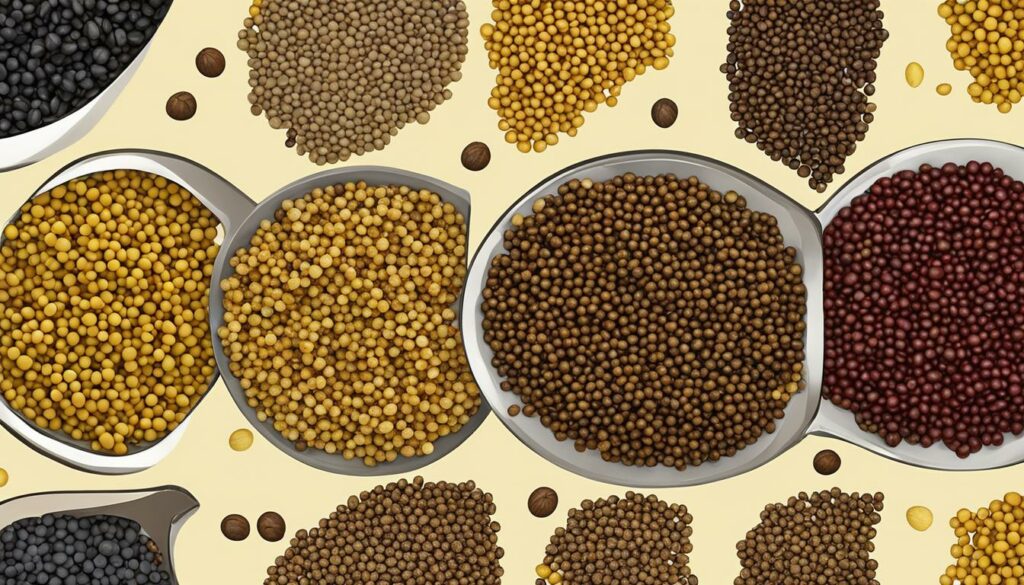
What Are Mustard Seeds Used For?
Mustard seeds have a wide range of uses in cooking and can be enjoyed in various forms. They can be used whole, in powdered form, or as a paste, adding depth and flavor to your dishes. These versatile seeds complement other spices and herbs beautifully, enhancing the overall taste and texture of your culinary creations.
Here are some of the uses of mustard seeds:
- Add whole mustard seeds to tempering or tadka in Indian cuisine. Heat oil or ghee, add mustard seeds, and let them splutter to release their unique aroma and flavor.
- Grind mustard seeds into a fine powder to create mustard powder, which is commonly used in condiments, pickling spice blends, and marinades.
- Mix mustard powder with water to create a mustard paste, which can be used as a spread for sandwiches, as a base for dressings, or in sauces.
Mustard seeds work particularly well with other spices and herbs like curry leaves and ginger, complementing their flavors and adding complexity to your dishes. Whether you’re preparing a traditional curry, a tangy pickle, or a spicy marinade, mustard seeds will elevate the taste profile and make your recipes truly memorable.
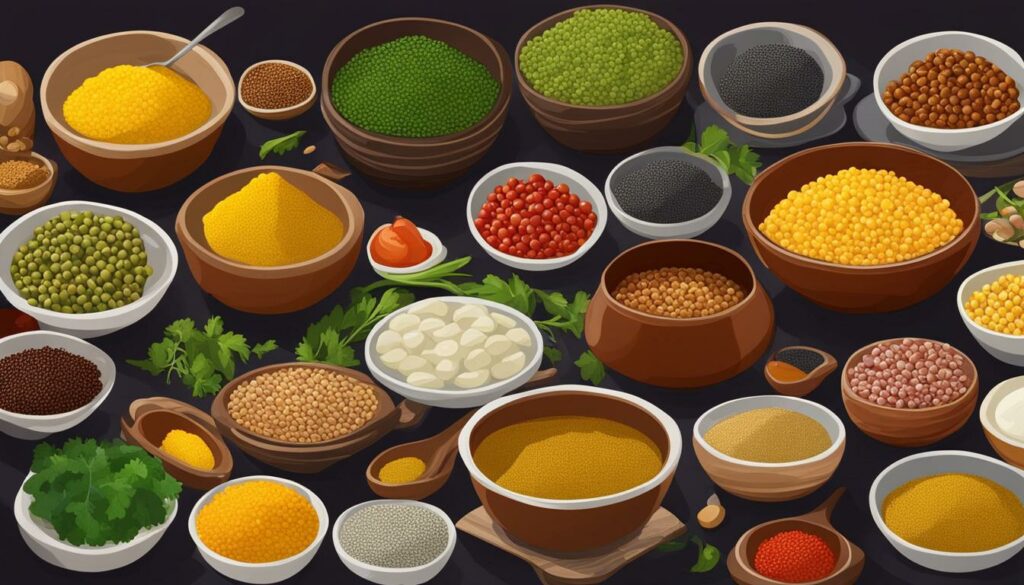
So, the next time you’re in your kitchen, remember to reach for the mustard seeds and explore the delicious possibilities they offer. Unleash the culinary power of these tiny seeds and take your cooking to new heights!
Delightful Uses of Mustard Seeds in Cooking
Mustard seeds are a versatile ingredient that can elevate the flavors of your dishes in various ways. Whether you’re a seasoned chef or an amateur cook, exploring the delightful uses of mustard seeds will take your culinary adventures to new heights.
1. Tempering
Tempering mustard seeds in oil is a popular technique used in Indian cuisine. This process involves heating oil and adding whole mustard seeds until they crackle and release their aroma. The tempered mustard seeds can then be added to curries, lentils, or even rice dishes for an extra burst of flavor.
2. Pickling
Adding pickled mustard seeds to your favorite vegetables can add a tangy kick and elevate their taste. To make pickled mustard seeds, combine equal parts mustard seeds, vinegar, and a sweetener like honey or sugar. Let the mixture sit for a few hours or overnight to allow the flavors to meld together. The pickled mustard seeds can be used as a condiment for sandwiches, salads, or even grilled meats.
3. Roasting
Roasting mustard seeds intensifies their flavor and adds depth to your dishes. Simply heat a dry pan over medium heat, add the mustard seeds, and toast them until they become slightly darker and fragrant. Roasted mustard seeds can be used as a crunchy topping for salads, roasted vegetables, or even mixed into bread dough for a unique twist.
4. Mustard Seed Paste
Creating a mustard seed paste opens up a world of possibilities in your cooking. To make the paste, blend or grind mustard seeds with water, vinegar, or lemon juice until you achieve a smooth consistency. This versatile paste can be used as a base for spreads, sauces, dressings, and marinades. You can customize the paste by adding herbs, spices, or even sweeteners to suit your taste.
5. Mustard Seed Spice Blend
Combining mustard seeds with other spices creates a homemade spice blend that can elevate any dish. Experiment with different proportions of mustard seeds, cumin seeds, coriander seeds, fenugreek seeds, and other spices to create unique flavor profiles. Use the spice blend to season meats, vegetables, or even sprinkle it over popcorn for a flavorful snack.
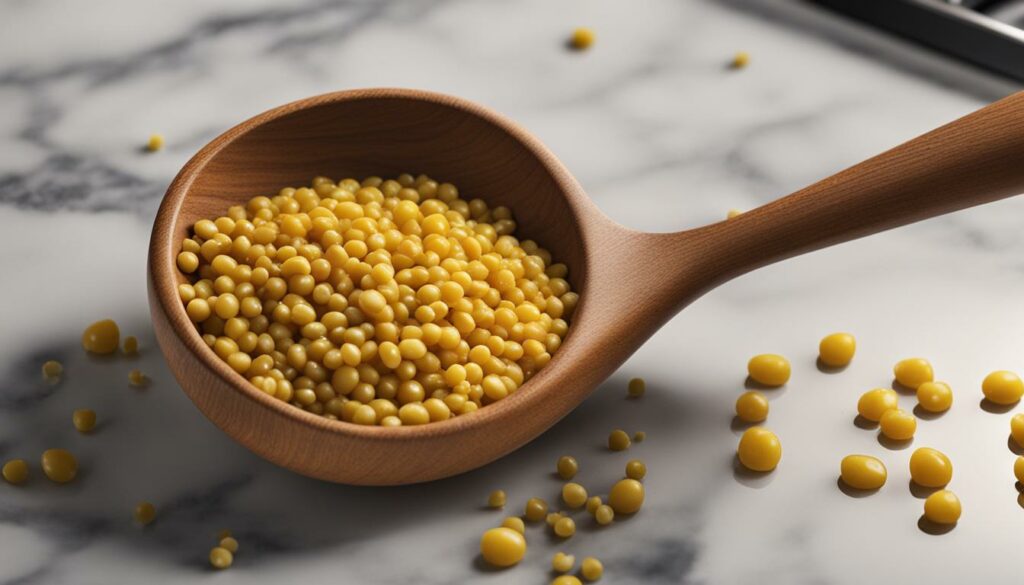
As you explore these delightful uses of mustard seeds in your cooking, you’ll discover how this tiny ingredient can make a big impact on your palate. Whether you’re tempering, pickling, roasting, making mustard seed paste, or creating a spice blend, mustard seeds are sure to add a delicious and distinctive element to your culinary creations.
Mustard Seeds’ Health Benefits
Mustard seeds offer a range of health benefits that can contribute to your overall well-being. Packed with essential vitamins and minerals, they provide a natural source of nutrients necessary for various bodily functions.
Vitamins and Minerals
Mustard seeds contain a wealth of vitamins, including B-complex vitamins, vitamin E, and minerals such as selenium, zinc, copper, and iron. These nutrients play a vital role in maintaining optimal health and supporting the body’s functions.
Psoriasis Treatment
The vitamins and minerals present in mustard seeds have been linked to potential benefits in treating psoriasis, a chronic skin condition characterized by dry, itchy, and inflamed patches.
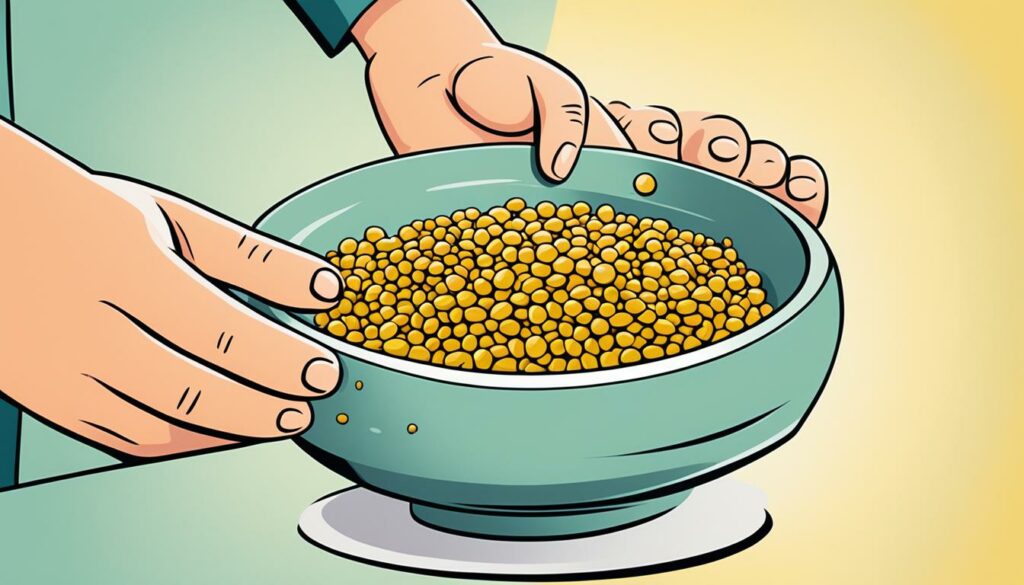
Cancer Prevention
Mustard seeds contain compounds known as glucosinolates, which have been found to help prevent cancer-causing cell growth. These compounds have shown promising results in laboratory studies, offering potential benefits in cancer prevention.
Digestive Health
The fiber content in mustard seeds aids in maintaining a healthy digestive system. It promotes regular bowel movements and helps prevent constipation. Additionally, mustard seeds have digestive enzymes that assist in breaking down complex foods, enhancing overall digestion.
Weight Loss
Mustard seeds can be beneficial for weight loss due to their low calorie and high nutrient content. The fiber present in these seeds helps increase satiety, keeping you fuller for longer periods and reducing overall calorie intake.
Skin and Hair Health
Mustard seeds contain essential nutrients that promote healthy skin, hair, nails, and teeth. The vitamins and minerals present contribute to the production of collagen, a protein that maintains skin elasticity and strength.
Mustard seeds offer a rich source of vitamins, minerals, and other compounds that have potential health benefits, including treating psoriasis, preventing cancer cell growth, aiding digestion, promoting weight loss, and supporting healthy skin and hair.
| Benefit | Description |
|---|---|
| Psoriasis Treatment | Mustard seeds may help alleviate symptoms of psoriasis, a chronic skin condition. |
| Cancer Prevention | Compounds in mustard seeds have shown potential in preventing cancer-causing cell growth. |
| Digestive Health | Mustard seeds aid in digestion and promote a healthy digestive system. |
| Weight Loss | Mustard seeds can support weight loss by increasing satiety and reducing calorie intake. |
| Skin and Hair Health | Mustard seeds contribute to healthy skin, hair, nails, and teeth, enhancing overall appearance. |
Mustard Seed Substitutes and Food Pairings
If you don’t have mustard seeds on hand, don’t worry! There are several alternatives you can use in your recipes. Dry mustard powder and mustard sauce are great substitutes that can give your dishes a similar flavor profile. Simply adjust the measurements according to your taste preferences.
If you’re looking for a substitute that provides a similar crunch, consider using sesame seeds or poppy seeds. They add texture and a touch of nuttiness to your dishes.
Another helpful tip is that different varieties of mustard seeds, such as yellow and brown, can be used interchangeably in most recipes. They have similar flavor profiles and can yield delicious results. Use what you have available or experiment with different varieties to discover your personal preference.
When it comes to food pairings, mustard seeds can complement a wide range of ingredients and dishes. Here are some tasty combinations to try:
| Food Pairing | Mustard Seed Variety |
|---|---|
| Green beans | Yellow or brown mustard seeds |
| Cabbage | Yellow or brown mustard seeds |
| Ginger | Yellow or brown mustard seeds |
| Chicken | Yellow or brown mustard seeds |
| Lamb | Yellow or brown mustard seeds |
| Seafood | Yellow or brown mustard seeds |
| Curries | Yellow or brown mustard seeds |
Get creative in the kitchen and explore the endless possibilities of mustard seed substitutes and food pairings. Whether you’re experimenting with different flavors or using what you have available, mustard seeds can elevate your dishes and add a unique touch.
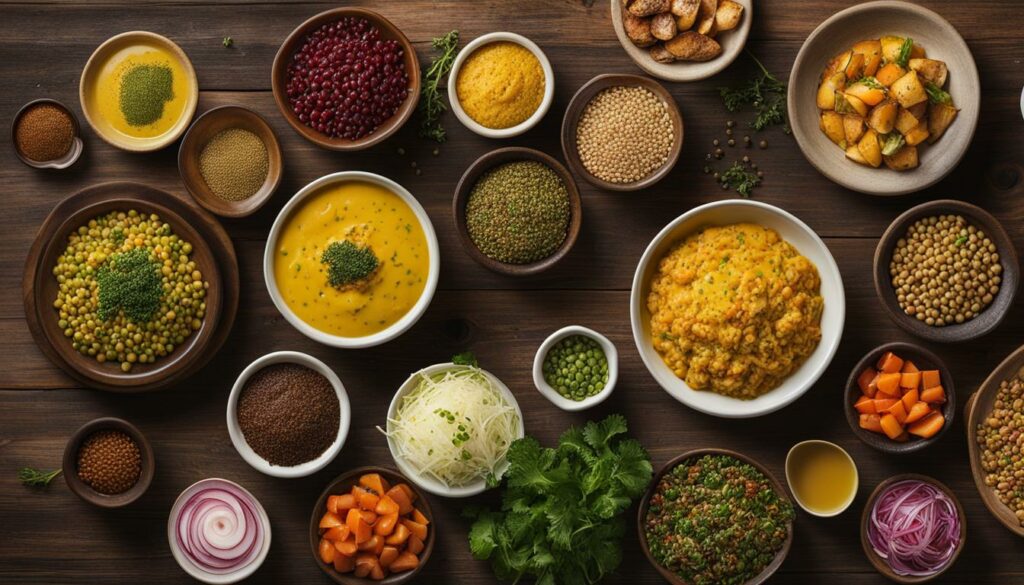
Freshen Up Your Recipes
Try incorporating mustard seeds in your next recipe to experiment with new flavors and enhance your culinary creations. The subtlety and versatility of mustard seeds make them a fantastic addition to dishes ranging from salads to stews. Enjoy exploring the world of mustard seeds and the delightful taste they bring to your meals.
Conclusion
Mustard seeds are a versatile ingredient that can elevate the flavor and texture of your dishes in the kitchen. Their unique taste adds a mild aromatic nuttiness to your recipes, while their pungency and bitterness can give a bold kick when ground or bitten into.
But mustard seeds aren’t just limited to cooking. They also offer a range of potential health benefits, making them a valuable addition to your everyday routines. Rich in vitamins, minerals, and antioxidants, mustard seeds support digestion, aid in weight loss, and promote overall digestive health. Not only that, but they have also been found to potentially have anti-inflammatory properties, making them an excellent choice for fighting inflammation in the body.
When it comes to skincare and hair growth, mustard seeds have been used for centuries. Their oil is known to moisturize and nourish the skin, leaving it soft and supple. Additionally, mustard seed oil is believed to stimulate hair growth and prevent hair loss, making it a popular choice for those seeking to improve the health of their hair.
Incorporate mustard seeds into your cooking and self-care routines to enjoy their many benefits. Experiment with different recipes and spice blends to discover new and exciting ways to use this versatile ingredient in your kitchen. From enhancing the flavors of your favorite dishes to improving digestion, reducing inflammation, and boosting your skin and hair health, mustard seeds truly are a powerhouse ingredient you don’t want to overlook.
FAQ
What are the culinary uses of mustard seeds?
Mustard seeds can be used in various ways in cooking. They can be used whole, in powdered form, or as a paste. They complement other spices and herbs, enhance the overall taste and texture of dishes, and are used to make mustard powder, spreads, sauces, dressings, and marinades.
How do mustard seeds taste?
Mustard seeds have a mild aromatic nutty taste when whole. However, they become pungent, slightly bitter, and strong when bitten into or ground into a powder or paste. The taste can be described as similar to wasabi or horseradish.
What are the different types of mustard seeds?
There are three main types of mustard seeds: yellow, black, and brown. Yellow mustard seeds are milder and commonly used to make mustard sauce and pickling spice. Black mustard seeds are smaller and stronger in flavor, while brown mustard seeds are smaller and have a slightly sour taste.
What are mustard seeds used for?
Mustard seeds are used in a variety of ways in cooking. They can be tempered in oil for curries and lentils, pickled to add a tangy kick to vegetables, roasted to enhance their flavor, and used to make mustard seed paste for spreads and sauces. They can also be combined with other spices to create homemade spice blends.
What are some delightful uses of mustard seeds in cooking?
Some delightful uses of mustard seeds in cooking include tempering them in oil for curries and lentils, pickling them to add tanginess to vegetables, roasting them to enhance their flavor, making mustard seed paste for spreads and sauces, and combining them with other spices to create homemade spice blends.
What are the health benefits of mustard seeds?
Mustard seeds are rich in vitamins and minerals and offer several health benefits. They potentially help treat psoriasis, prevent cancer-causing cell growth, aid in digestive health and weight loss, and promote healthy skin, hair, nails, and teeth.
What can be used as a substitute for mustard seeds and what foods pair well with them?
If you don’t have mustard seeds on hand, you can substitute them with dry mustard powder or mustard sauce. For a similar crunch, you can use sesame seeds or poppy seeds. Different varieties of mustard seeds, such as yellow and brown, can be used interchangeably. Mustard seeds pair well with a variety of foods, including green beans, cabbage, ginger, chicken, lamb, seafood, and curries.
What are the uses and benefits of mustard seeds?
Mustard seeds are a versatile ingredient that enhances the flavor and texture of dishes in the kitchen. They also offer potential health benefits, making them a valuable addition to your cooking and self-care routines. Mustard seeds have a wide range of uses, from cooking to skincare and hair growth.
Source Links
- https://spiceitupp.com/what-are-mustard-seeds-and-how-to-use-them-for-cooking/
- https://www.savorysuitcase.com/how-to-use-mustard-seeds-in-cooking/
- https://askdrnandi.com/health-benefits-of-mustard-seed/

